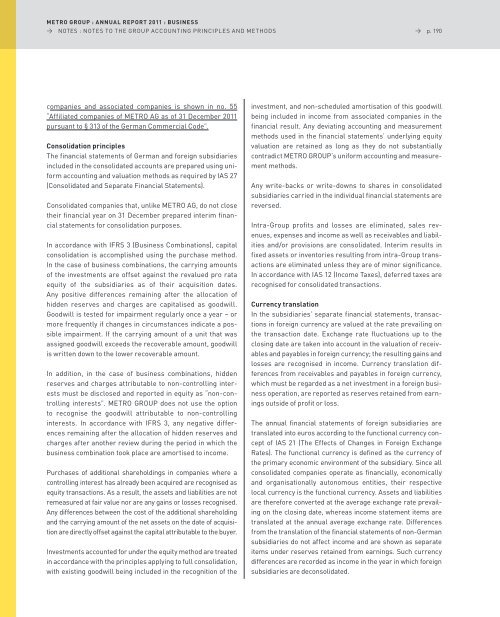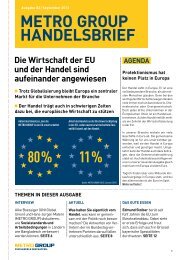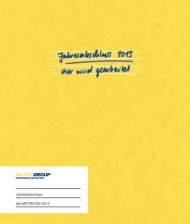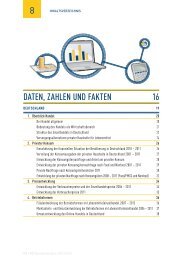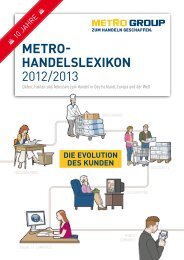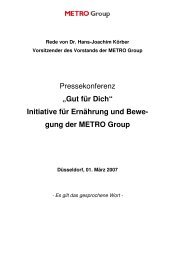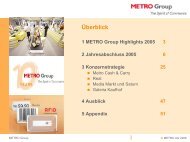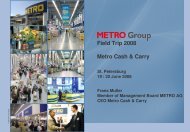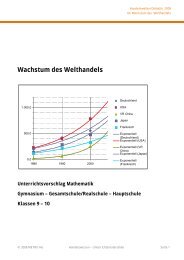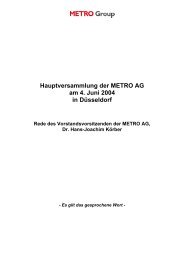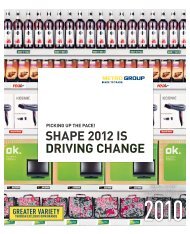pdf (22.8 MB) - METRO Group
pdf (22.8 MB) - METRO Group
pdf (22.8 MB) - METRO Group
You also want an ePaper? Increase the reach of your titles
YUMPU automatically turns print PDFs into web optimized ePapers that Google loves.
<strong>METRO</strong> gROUP : ANNUAL REPORT 2011 : BUsiNEss<br />
→ noTes : noTes To THe GRoUp aCCoUnTInG pRInCIples anD MeTHoDs<br />
companies and associated companies is shown in no. 55<br />
“affiliated companies of MeTRo aG as of 31 December 2011<br />
pursuant to § 313 of the German Commercial Code”.<br />
Consolidation principles<br />
The financial statements of German and foreign subsidiaries<br />
included in the consolidated accounts are prepared using uniform<br />
accounting and valuation methods as required by Ias 27<br />
(Consolidated and separate Financial statements).<br />
Consolidated companies that, unlike MeTRo aG, do not close<br />
their financial year on 31 December prepared interim financial<br />
statements for consolidation purposes.<br />
In accordance with IFRs 3 (Business Combinations), capital<br />
consolidation is accomplished using the purchase method.<br />
In the case of business combinations, the carrying amounts<br />
of the investments are offset against the revalued pro rata<br />
equity of the subsidiaries as of their acquisition dates.<br />
any positive differences remaining after the allocation of<br />
hidden reserves and charges are capitalised as goodwill.<br />
Goodwill is tested for impairment regularly once a year – or<br />
more frequently if changes in circumstances indicate a possible<br />
impairment. If the carrying amount of a unit that was<br />
assigned goodwill exceeds the recoverable amount, goodwill<br />
is written down to the lower recoverable amount.<br />
In addition, in the case of business combinations, hidden<br />
reserves and charges attributable to non-controlling interests<br />
must be disclosed and reported in equity as “non-controlling<br />
interests”. MeTRo GRoUp does not use the option<br />
to recognise the goodwill attributable to non-controlling<br />
interests. In accordance with IFRs 3, any negative differences<br />
remaining after the allocation of hidden reserves and<br />
charges after another review during the period in which the<br />
business combination took place are amortised to income.<br />
purchases of additional shareholdings in companies where a<br />
controlling interest has already been acquired are recognised as<br />
equity transactions. as a result, the assets and liabilities are not<br />
remeasured at fair value nor are any gains or losses recognised.<br />
any differences between the cost of the additional shareholding<br />
and the carrying amount of the net assets on the date of acquisition<br />
are directly offset against the capital attributable to the buyer.<br />
Investments accounted for under the equity method are treated<br />
in accordance with the principles applying to full consolidation,<br />
with existing goodwill being included in the recognition of the<br />
→ p. 190<br />
investment, and non-scheduled amortisation of this goodwill<br />
being included in income from associated companies in the<br />
financial result. any deviating accounting and measurement<br />
methods used in the financial statements’ underlying equity<br />
valuation are retained as long as they do not substantially<br />
contradict MeTRo GRoUp’s uniform accounting and measurement<br />
methods.<br />
any write-backs or write-downs to shares in consolidated<br />
subsidiaries carried in the individual financial statements are<br />
reversed.<br />
Intra-<strong>Group</strong> profits and losses are eliminated, sales revenues,<br />
expenses and income as well as receivables and liabilities<br />
and/or provisions are consolidated. Interim results in<br />
fixed assets or inventories resulting from intra-<strong>Group</strong> transactions<br />
are eliminated unless they are of minor significance.<br />
In accordance with Ias 12 (Income Taxes), deferred taxes are<br />
recognised for consolidated transactions.<br />
Currency translation<br />
In the subsidiaries’ separate financial statements, transactions<br />
in foreign currency are valued at the rate prevailing on<br />
the transaction date. exchange rate fluctuations up to the<br />
closing date are taken into account in the valuation of receivables<br />
and payables in foreign currency; the resulting gains and<br />
losses are recognised in income. Currency translation differences<br />
from receivables and payables in foreign currency,<br />
which must be regarded as a net investment in a foreign business<br />
operation, are reported as reserves retained from earnings<br />
outside of profit or loss.<br />
The annual financial statements of foreign subsidiaries are<br />
translated into euros according to the functional currency concept<br />
of Ias 21 (The effects of Changes in Foreign exchange<br />
Rates). The functional currency is defined as the currency of<br />
the primary economic environment of the subsidiary. since all<br />
consolidated companies operate as financially, economically<br />
and organisationally autonomous entities, their respective<br />
local currency is the functional currency. assets and liabilities<br />
are therefore converted at the average exchange rate prevailing<br />
on the closing date, whereas income statement items are<br />
translated at the annual average exchange rate. Differences<br />
from the translation of the financial statements of non-German<br />
subsidiaries do not affect income and are shown as separate<br />
items under reserves retained from earnings. such currency<br />
differences are recorded as income in the year in which foreign<br />
subsidiaries are deconsolidated.


